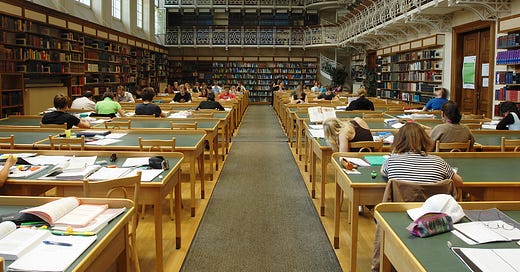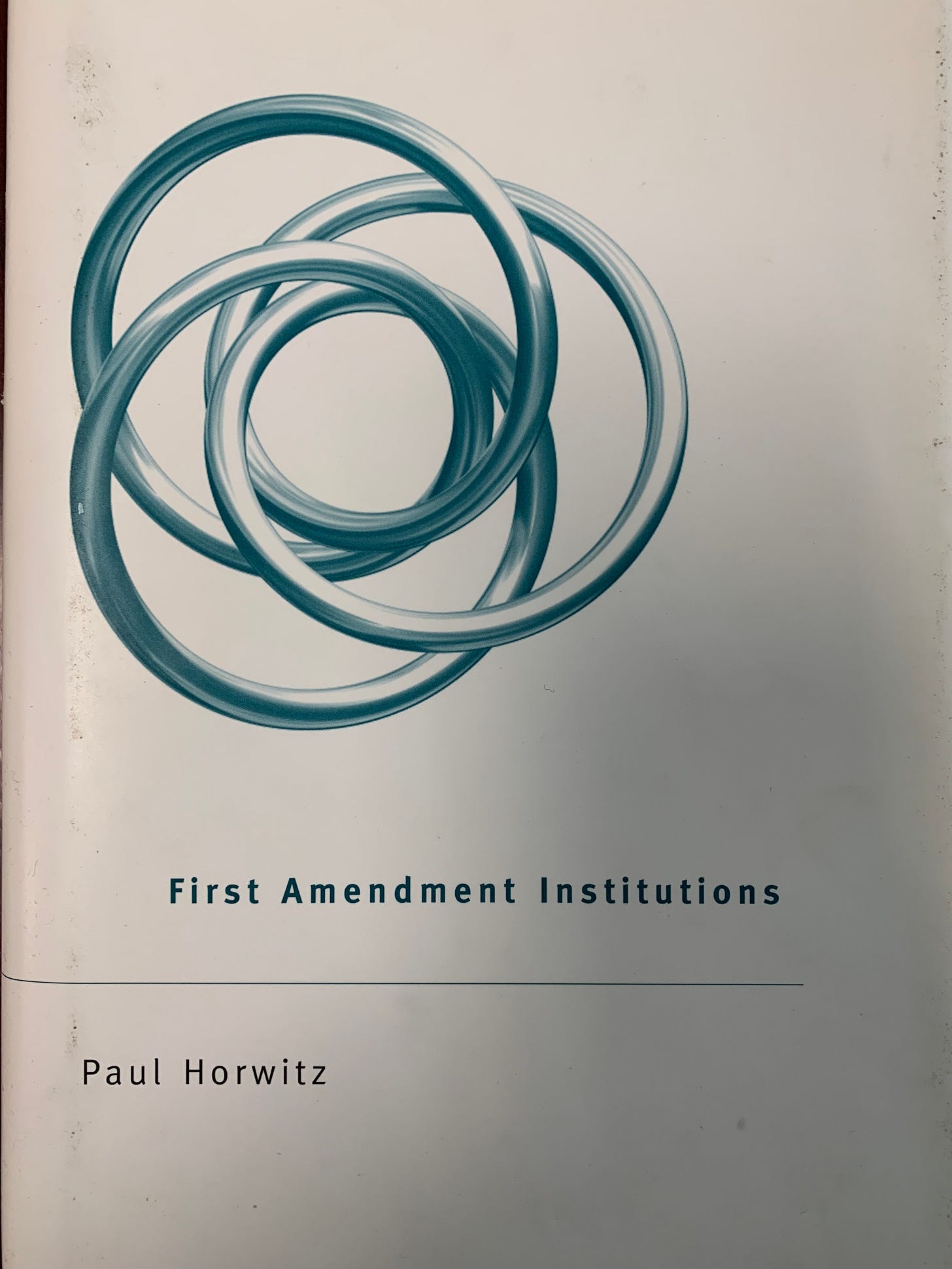The Purpose of the University
Reflections on the limits of discourse and disagreement in higher education
Author’s note: this is a special edition of my weekly newsletter in lieu of a Friday release. If you are a creature of habit, you can wait until Friday to read it. I’ll send my next post on 9/30.
Over the past few years, I have spent time thinking and writing about the purpose of the university: what are universities for, what are they not for, and when should they limit viewpoints and beliefs?
In a 2018 article, “The Purpose (and Limits) of the University” published in the Utah Law Review, I adopted philosopher Alasdair MacIntyre’s description of the university as “a place of constrained disagreement.” I suggested this conception works best in the residential university, where students live and learn together, and where they experience regular in-person contact with each other and their professors. Learning to disagree, and learning how to disagree, is best accomplished through embodied relationships.
In his phrase “constrained disagreement,” MacIntyre’s adjective is as important as his noun. The university cannot actually be a freewheeling “marketplace of ideas” that welcomes all viewpoints and ideas. Today’s universities are not going to entertain flat earthers or Holocaust deniers.
But what other topics can be deemed altogether outside the scope of plausible university discourse? And who decides?
In the News
This past Friday, Holden Thorp, the editor-in-chief of Science and former provost of the university where I teach, published an essay in The Chronicle of Higher Education titled “The Charade of Political Neutrality.” Thorp began by asserting that abortion, climate change, the role of race and slavery in the history of the United States, and transgender rights are all “squarely within the wheelhouse of the university.” But he didn’t mean that these issues were properly the subject of discourse and debate; he meant there are right answers to all of them and university leaders should adopt those answers:
We know gun-control laws save lives. We know climate mitigation is desperately needed. We know gender-affirming care promotes positive mental health. We know these things because we can measure them. Can we be neutral about something we can observe? We’re not neutral about linear algebra or accounting.
Thorp called the unwillingness of academic leaders to take a stand on these and other issues “a gift to forces that seek to undermine science and other objective analysis.” He chided those who advocate “teaching the controversy” as part of an “anti-science playbook.” For Thorp, “a few rogue experts come in and confuse the public just enough to forestall any policy actions based on established facts. Tobacco, ozone, climate, Covid—it’s always the same story.”
In My Head
I was a bit puzzled reading Thorp’s claim that disagreements over abortion, climate change, the role of race and slavery in the history of the United States, transgender rights, tobacco, ozone, climate, and Covid are all driven by “a few rogue experts” who are “anti-science” and insist on “teaching the controversy.”
As an initial matter, Thorp seems to equate science with policy. Science gives us data from which to make arguments for or against various policies, in conjunction with other empirical and normative inputs, the latter of which include law, ethics, and political theory. Science alone did not give us any Covid policies—it gave us a starting point from which to debate and enact those policies, some of which have saved many lives, others of which have been incredibly harmful. Science does not answer whether Dobbs was right as a matter of constitutional law or what the appropriate abortion policy should be. Science does not tell us what the legal and social approach to transgender rights should be in this country.
As I read Thorp’s essay, I wondered what he thought of leaders of universities like Notre Dame and Baylor who take institutional positions on the other side of some of the issues that he deems clear-cut. Are they leading “anti-science” institutions? Are they performing a disservice or even actively harming this country by starting from different normative viewpoints?
In a pluralistic society that recognizes strong protections for the expressive and cultural distinctiveness of private institutions, I would expect to see different visions of the good emerge from different institutions. Notre Dame and Yale will likely establish different baselines for their boundaries of constrained disagreement, and that may even be desirable within the vast landscape of higher education. In fact, part of Thorp’s argument could be enlisted toward greater clarity in precisely this direction: some university leaders could stake out stronger normative positions on the issues that divide us. But these would inevitably be based on complex policy choices not science alone. Moreover, those leaders would need to reflect the existing or aspirational values of their institutions. It’s not clear to me that many of today’s universities have values clear enough to coherently support contested policy choices across a range of fraught issues.
One way to turn down the heat on some of these arguments is to distinguish between truly fringe beliefs and those that encounter significant and widespread disagreement. As I noted in an earlier post, neither pro-choice nor pro-life beliefs are fringe views in medicine. The same could be said about some, but not all, of the other issues that Thorp catalogs. I know very few people—experts or otherwise—who dismiss the public health harms of tobacco. But that’s not the case with other matters Thorp sees as settled. And even an issue like tobacco leaves hard questions unanswered: the best policy to address the harms of tobacco draws on myriad factors beyond scientific input.
Some laws and policies may be indefensible based on the widespread consensus of relevant experts. I don’t want my students debating whether the 2020 election was stolen. Those arguments have been made in public discourse by “a few rogue experts,” but the overwhelming majority of experts in election law and related constitutional fields have soundly rejected them. But in many other matters—even controversial, emotional, and deeply personal ones—I hope the university can be a place of constrained disagreement whose boundaries are marked by its institutional identity and not merely the policy preferences of its leaders.
In the World
My thinking about the purpose of the university began in earnest in 2015 when I reviewed Paul Horwitz’s book, First Amendment Institutions. Professor Horwitz critiques an “acontextual” First Amendment that fails to account for the unique aspects of different kinds of institutions. He highlights five such institutions: universities, presses, churches, libraries, and associations.
My review explored whether Horwitz’s effort to cast the university as a First Amendment institution was weakened by competing interests in higher education today, including “the immense influence of government and corporate dollars, the vast revenues and resources from affiliated hospitals and clinics, and the constant pressures of high profile athletics.” I also surveyed four schools in Horwitz’s home state of Alabama: The University of Alabama (where he teaches), Shelton State Community College, Air University (the educational arm of the United States Air Force), and Heritage Christian University. What makes these schools similar institutions? Do they share enough of a common thread to fit within a category of “university” that includes all of them but excludes, for example, McDonald’s Hamburger University (which Horwitz argues is not a university)?
Part of the answer, I think, lies in returning to MacIntyre’s understanding of the university as a place of constrained disagreement. That characterization may not capture all institutions of higher education, but it names an attribute shared by many of them. And it is in some tension with Thorp’s recent plea to simply follow the science. But don’t take my word for it. Pick up a copy of Horwitz’s book and see what you think about the arguments.







I think the best argument for why we should be reluctant to say viewpoints about policy are objectively true, and not within the realm of debate, is that not long ago many of those viewpoints would have been considered objectively false and not within the realm of debate -- a view that, if accepted then, would have prevented us from now realizing the opposite.
Your posts always provoke thought and this one on the interplay of science and policy is no different. I do wonder is adopting MacIntyre perhaps unhelpfully focuses your argument toward making your point about the contexts of disagreement. Would your argument look significantly different if you defined a university as “a community of disciplined learning”? Constrained disagreement could take place in and be rooted a context of an educational mission. Just a musing from a hillbilly lawyer for your learned consideration.